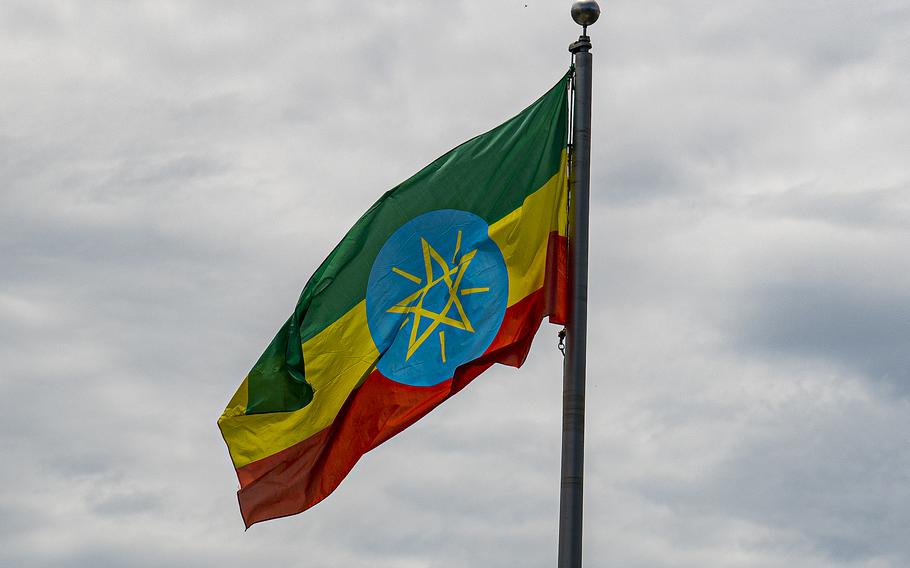
The Ethiopian flag flies above Ethiopia’s embassy in Washington, D.C., on July 6, 2022. ( Carlos Bongioanni/Stars and Stripes)
Ethiopia’s army stepped up an offensive against rebel fighters in the northern Tigray region, a move that’s set to worsen a humanitarian crisis triggered by a civil war that began almost two years ago.
Thousands of Prime Minister Abiy Ahmed’s soldiers, backed by regional militia and neighboring Eritrea, have converged on the town of Axum, about 220 kilometers (137 miles) from Mekelle, Tigray’s capital, after taking control of three key towns to the north and south of the city in recent days, according to three diplomatic and humanitarian officials. They spoke on condition of anonymity because they aren’t authorized to speak publicly.
The unfolding developments come as diplomats seek to finalize plans for peace talks that Ethiopia’s government on Thursday said are set to start in South Africa on Oct. 24. The conflict has left thousands of people dead and millions more in need of food aid.
The latest attacks, which were mounted from the east and south of Tigray, have intensified pressure on the region’s ruling Tigray People’s Liberation Front and their forces, whose military capacity remains unclear after weeks of intense fighting and who have no obvious methods to re-supply. The diplomats were uncertain whether the Tigrayans would retreat to plan an offensive, or fall back into more mountainous areas to hide and regroup as they did early on in the conflict.
Legesse Tulu, Ethiopia’s government spokesperson, Redwan Hussien, Abiy’s national security adviser, and Billene Seyoum, the prime minister’s spokesperson, didn’t immediately respond to requests for comment.
Tedros Adhanom Ghebreyesus, director-general of the World Health Organization, sounded alarm bells on Wednesday about the deteriorating situation in Tigray, warning that there was “a very narrow window now to prevent genocide.”
“There is no other situation globally in which 6 million people have been kept under siege for almost two years,” Tedros, who is from Tigray, told a media briefing. “Even people who have money are starving because they can’t access it. Children are dying every day from malnutrition. There are no services for tuberculosis, HIV, diabetes, hypertension and more.”
The war erupted in November 2020 after forces loyal to the TPLF, which was the nation’s pre-eminent power broker for decades before being sidelined by Abiy, attacked a federal army base. The conflict has drawn in neighboring Eritrea, which supports Abiy, and spilled over into Sudan, where thousands of civilians have taken refuge.
Fighting has escalated since hostilities resumed in August, ending a five-month humanitarian cease-fire.